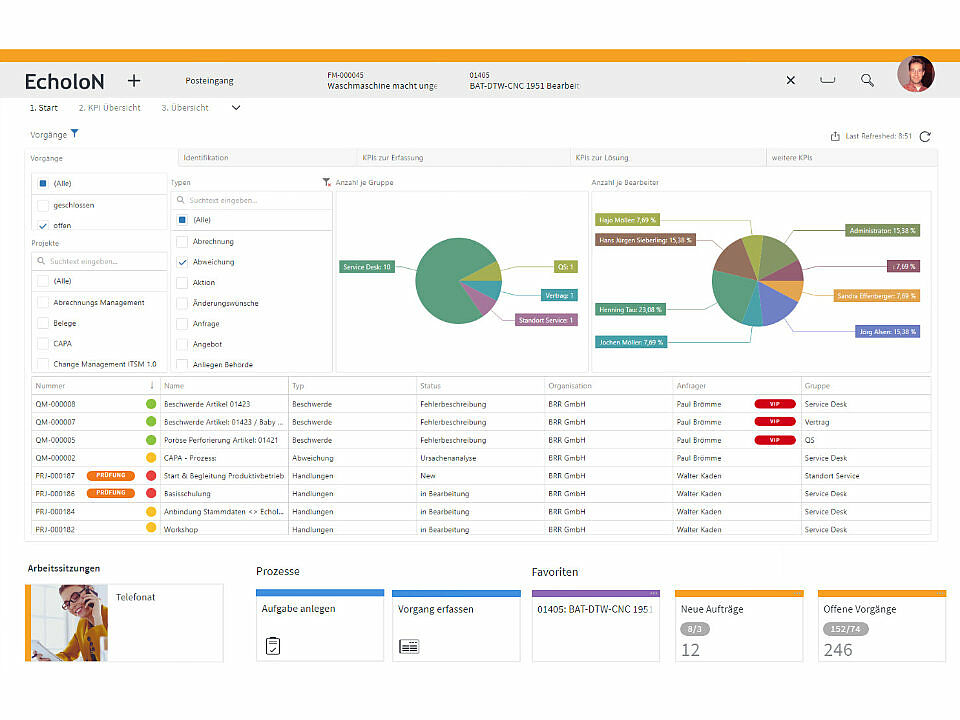
Author: Jochen Möller (Managing Director and Co-Founder of EcholoN)
Created: 30.04.2020, last modified: 18.07.2025
Table of contents
How does field service management work? And how do companies manage complex organisations?
How can field service management optimise field service?
What are the challenges of field service management?
How can field service management increase our business success?
How can field service management increase efficiency?
Field service management in maintenance and repair
What tools and technologies are used in field service management?
EcholoN – field service management software
Frequently asked questions about field service management
How does field service management work? And how do companies become masters of the complex organisation?
The type of internal communication in companies has - fortunately - changed rapidly in recent years: the former flood of e-mails gave way to efficient digitization of processes and thus a significant reduction in errors. This is also the case in the field service area. A completely independent management area was developed here, which is of great importance in companies, as it is significantly involved in customer satisfaction. But how does Field Service Management work? And how do companies manage the complex organization? You can read this and more in the following sections.
Definition: What is Field Service Management?
The term Field Service Management (FSM) is an extremely broad term. This becomes clear, among other things, if you read through the definition by Gartner, a well-known provider of market research results and analyzes of developments in IT. According to Gartner, the FSM comprises the following areas:
- Determination of the tasks of the field service by means of remote monitoring
- Preventive maintenance and inspections by field service employees on site
- Error detection and rectification
- Planning, control and optimization of the resources used, including, for example, material used, use of the vehicles and the scheduling of service employees
- Transmission of information to the field service
The fields of application of a field service management range from facility management and property management to field service for technology providers.
For the uncomplicated and above all quick organization of the respective task fields, companies nowadays mostly use efficient software solutions, so-called field service management software. Gone are the days of confusing and often unstructured e-mail communication; today digitized processes are the true path to effectiveness and, above all, cost savings.
"Never do anything halfway or you will lose more than you can ever catch up." Louis Armstrong
What tasks does Field Service Management cover?
Field service management encompasses a wide range of tasks. These include scheduling and coordinating field staff, optimising workflows and processes, managing service level agreements (SLAs), planning and scheduling work orders, enterprise asset management (EAM), invoicing and much more.
Why is Field Service Management important?
Field service management is essential for companies that provide field services. It enables efficient use of resources, minimises downtime, improves customer satisfaction and increases revenue. Through effective planning and coordination, companies can improve service quality, meet compliance requirements and attract repeat customers.
What exactly is software used for and what do you have to pay attention to?
The challenge in field service management is the optimal planning of the various resources. This so-called disposition is usually carried out by employees in the office who have to consider factors such as routes, appointments, qualifications of employees, working time models or material consumption.
On the other hand, there are the employees in the field, who are often out and about on their own and therefore spend a lot of time writing service reports, making notes of material usage and also recording their working hours.
This is where the software for simply structuring and planning the field service comes into play. On the one hand, thanks to functional algorithms, it helps to make scheduling as simple as possible for the office staff. It includes all factors in the planning, and spontaneous orders during the day are no longer a problem thanks to the software. It recognizes free periods and can assign the right service personnel directly. On the other hand, good field service management software can also be used directly on site. The field service employee can use the tool to import orders, create service reports, record his working hours and log his material consumption. What he needed a lot of time to do without software is now almost incidental.
In order to introduce an FSM solution, companies should pay attention to their respective requirements and circumstances. This means that the technically required infrastructure must be available and questions, for example whether a cloud or an on premise solution makes more sense, must be answered. Other factors such as company size and number of employees, number of branches, languages and legal bases must also be clarified.

How can Field Service Management optimise the field service?
Field Service Management can optimise the field service through various measures:
Efficient job scheduling
With a Field Service Management system, work orders can be scheduled more efficiently. By taking into account factors such as location, skills and technician availability, the FSM system can automatically create the best assignments to ensure that jobs are completed at the right time.
Automation of processes
Field service management systems automate various processes, such as generating work orders, assigning technicians, monitoring work schedules and invoicing. By automating these tasks, companies can streamline their business processes and reduce turnaround times.
Minimising deployment times
By efficiently scheduling and optimising routes, companies can minimise the deployment times of their field workers. This leads to higher productivity, lower travel costs and a faster response time to customer requests.

What are the challenges in Field Service Management?
Field service management also brings with it some challenges that companies have to overcome.
Increasing efficiency in the industry
Competition in the field service industry is fierce. Companies are under pressure to implement more efficient workflows and provide better service in order to stand out from the competition. Efficient field service management can help companies increase efficiency and stay competitive.
Real-time communication and data
Effective communication and real-time access to data are critical for field service. Field service management systems enable real-time communication between technicians, dispatchers and customers. With access to real-time data, technicians can quickly identify problems and provide solutions.
Optimising maintenance processes
Optiand optimised maintenance processes play a central role in field service management. Efficient maintenance processes enable companies to maximise asset life, minimise downtime and satisfy their customers.

How can Field Service Management increase our business success?
Field Service Management can increase business success in several ways.
Increasing turnover through efficient processes
Through efficient field service management, companies can optimise their processes and increase their efficiency. This leads to faster processing of orders, better utilisation of technicians and ultimately to an increase in turnover.
Improving customer satisfaction
Effective field service management enables companies to improve customer service and increase customer satisfaction. Through faster response time, accurate scheduling and high quality service, companies can gain the trust and satisfaction of their customers.
Increasing the productivity of field service staff
Field service management systems provide field service workers with tools and technology to do their jobs more efficiently. By using mobile apps, automated work orders and workflow optimisation, technicians can increase their productivity and complete more orders per day.

How can Field Service Management increase efficiency?
Field service management can increase efficiency by optimising different aspects of the service process.
Coordination of staff and resources
Field Service Management enables effective coordination of staff and resources. By centrally managing work orders, technician skills and availability, organisations can ensure that the right technicians are in the right place at the right time.
Effective dispatching of work orders
With a field service management system, work orders can be dispatched effectively. The system takes into account technician availability, location information and job urgency to create optimal schedules.
Optimising asset management
Field service management also includes asset management and optimisation. By monitoring maintenance intervals, spare parts availability and effectively managing the asset lifecycle, companies can optimise asset utilisation and minimise downtime

Field Service Management in maintenance and servicing
Field Service Management plays a crucial role in the maintenance and servicing of plants and machinery. It refers to the organisation, coordination and optimisation of service activities on site. The goal of FSM is to ensure that maintenance and servicing work is carried out efficiently and effectively to maximise plant uptime and minimise interruptions. FSM software enables companies to schedule jobs, assign technicians, track the status of jobs in real time and ensure a faster response time to service requests. In addition, FSM solutions can be used to track maintenance histories, equipment inventory and costs to enable informed decision making.
Field Service Management in Maintenance
In maintenance, field service management plays a critical role in maximising technician efficiency and productivity. Using automated scheduling tools and mobile apps, maintenance jobs can be efficiently organised, distributed and monitored. Technicians can access important information such as maintenance history and spare parts inventories on site to carry out a quick and effective repair. This can reduce downtime and increase customer satisfaction. In addition, Field Service Management enables the collection of important data such as working hours and material consumption to provide accurate accounting and statistics on the performance of the maintenance team.
Field Service Management in servicing
Field Service Management enables companies to deploy their maintenance teams efficiently, maximise resources and minimise costs. It involves scheduling jobs, dispatching technicians, monitoring workflows and gathering information. An effective field service management strategy is critical to ensure smooth operations and high maintenance performance.
How does Field Service Management interact with CMMS?
Field service management and computerised maintenance management system (CMMS) are two interconnected systems used in the maintenance industry. CMMS software is a solution that supports the planning, monitoring and management of maintenance activities in a company. FSM, on the other hand, refers to the coordination of field service technicians and their work assignments on site. The integration of FSM and CMMS software enables seamless communication between office and field teams. Thanks to FSM, field service technicians can obtain the necessary information about maintenance processes and maintain it directly in the CMMS by processing the tasks. This integration increases the productivity of the entire maintenance process.

What tools and technologies are used in Field Service Management?
Various tools and technologies are used in field service management to optimise work processes.
These technologies are the foundation for the efficiency and productivity of field service employees. They not only help improve communication between technicians and the office, but also enable more accurate planning and execution of service orders. With the right tools, companies can better manage their resources and increase customer and employee satisfaction.
Cloud-based field service management services
Cloud-based FSM services enable companies to efficiently manage their field service operations. With access to the cloud, field service managers can access work orders, technician times, maintenance histories and other relevant data from anywhere. This flexibility leads to faster response times and improves decision-making, as information is immediately available.
Mobile applications for technicians
Technicians can use mobile applications to receive work orders, view customer data, log times and share information with the office in real time. Mobile applications enable seamless communication and improve the efficiency of field service employees. By using mobile technologies, technicians are able to complete their work faster and more accurately, which ultimately also increases service quality.
Automated work orders and workflows
Field service management solutions automate work orders and workflows to increase efficiency. By automating order assignments, escalation rules and approval processes, companies can save time and process orders faster. Automation reduces human error and allows employees to focus on value-adding activities instead of administrative tasks.

EcholoN - Field Service Management Software
EcholoN has developed a flexible mobile app for field service technicians that can be used both online and offline outside the office. Thanks to offline mode, control of the field service is guaranteed even in the event of network failures. Service technicians can access service orders and customer devices and systems on site, view the history, edit them, and book times and materials. By using EcholoN as field service management software, all field service processes can be designed efficiently and practically.
What field service management means is not only evident in the organisation of a technician's daily routine. EcholoN goes further: it can be individually adapted to the specific requirements of your company and is used across a wide range of industries – from plant and mechanical engineering to energy supply. With smart modules such as checklists, automated and intelligent distribution of orders and the use of augmented reality functions, EcholoN offers extended control for complex service assignments. The integration of AI helps to automatically coordinate service tickets or suggest spare parts as needed.
Difference to other solutions
The EcholoN FSM software stands out thanks to its wide range of functions. In addition to time recording and integrated route planning, it also allows open tickets to be assigned to specific locations – particularly useful when field service requires a quick and flexible response. Through the integration of partner companies, external resources can also be integrated with pinpoint accuracy – an important advantage for fulfilling field service management tasks in real time.
Another distinguishing feature is that EcholoN software not only controls mobile customer service, but also specifically improves the customer experience. Customers are kept up to date, queries are minimised and service management results in satisfied customers. The link to customer relationship management systems also provides a holistic view of every service call. This makes collaboration between field service and headquarters even more efficient.
The most important points at a glance:
- EcholoN is a field service software that makes all field service processes as efficient as possible.
- The mobile app / web app allows access to all relevant data outside the office - even offline.
- AI, augmented reality and checklists enable new, advanced functions to be implemented.
- Optimal resource planning and allocation is automatic - even with external resources.
- The software sustainably improves the customer experience and ensures satisfied customers.
- EcholoN can be adapted to the specific requirements of your company and used in many industries.
- The main goal of field service management - reducing downtime, speeding up processes and cutting costs - is achieved.
Frequently asked questions about field service management
What is field service management?
Field service management (FSM) refers to the planning, execution and management of services provided outside a company. It includes coordinating field service employees, providing field service solutions and managing customer relationships.
How does field service management support management?
Field service management supports management by providing a centralised system for managing all field service activities. This enables efficient planning, execution and tracking of service calls and ensures that customers are kept up to date.
How do you integrate field service management into existing systems?
To integrate field service management, existing systems, such as customer relationship management (CRM), must be combined with FSM software. This enables seamless data transfer between systems and better coordination of field service employees.
What solutions are available for field service management?
There are various solutions for field service management, including mobile FSM software that enables field service employees to capture and update information in real time. These solutions make all field service processes as efficient and cost-effective as possible.
How does field service management manage field service processes?
Field service management manages field service processes by providing a structured approach to planning and executing service calls. It ensures that resources are used optimally and that customer satisfaction is guaranteed.
What are the challenges in field service management?
Challenges in field service management include efficient call planning, ensuring technician availability and managing customer requests. FSM tools help overcome these challenges and increase efficiency.
How do you stay in touch with customers in field service management?
In field service management, it is important to keep customers regularly informed about the status of their service requests. This can be done through automated notifications, regular updates and personal communication to increase customer satisfaction.
Why is it important to optimise field service management?
Optimising field service management is crucial to increasing efficiency, reducing costs and ensuring customer satisfaction. By using FSM software, companies can continuously improve and adapt their field service processes.
You may also find this interesting:
- EcholoN FSM - Field Service Management Software
- Customer service & customer support and after-sales service
- Maintenance software for reliable processes
- Blog article: Route optimisation in field service
- Blog article: Difference between maintenance, inspection, servicing and repair
- Blog article: What is preventive maintenance?
- Blog article: What is predictive maintenance?
- Blog article: What is customer service management (CSM)?
- Blog article: CMMS – Computerised Maintenance Management System – Maintenance Planning and Control System (IPS)
- Blog article: What is Enterprise Asset Management (EAM)?
- Blog article: Automating maintenance planning with software: 5 mistakes to avoid
